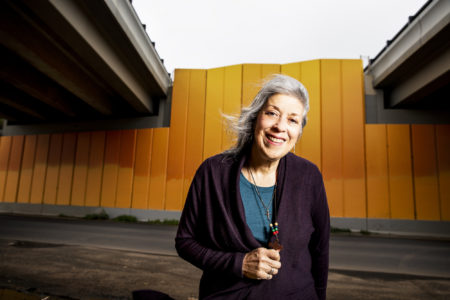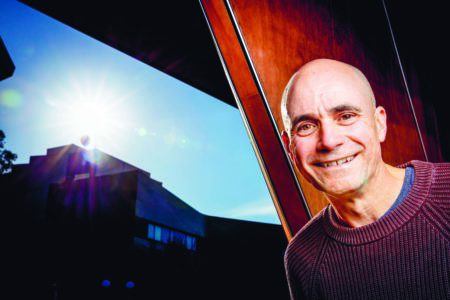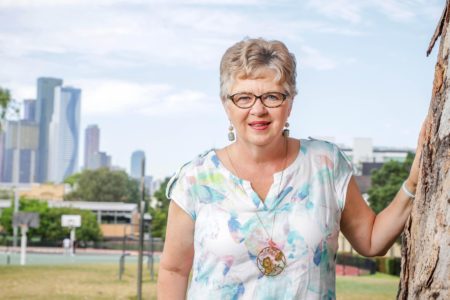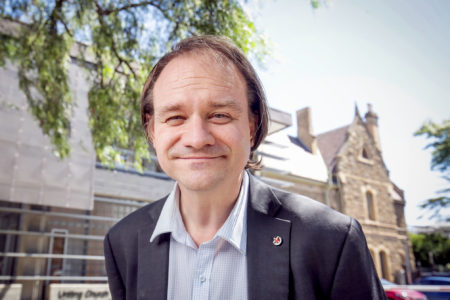Andy Calder has dedicated his life to people labelled with disability or mental illness. It is a calling that has challenges on many levels. Why, for example, does prejudice and stigmatisation still exist? Why aren’t there sufficient supports in place and, not least of all, if we are created in the image of God, why does disability and mental illness even exist?
Interview by Stephen Acott
What’s your title and when did you begin?
My title is Disability Inclusion Advocate. The position was created in 1995. I had some history working in the disability sector before being ordained so the church wanted to utilise that experience.
It doesn’t sound like you had much experience in the mental health sphere before assuming this role?
I’d been on the edge of it with some of my previous jobs but nothing to the degree that I am now involved.
What drove your passion to participate in this sphere?
I can remember way back, 40-plus years ago, when I was in a very active youth group in Deepdene. One of the things we used to do was sing carols each Christmas at Kew Cottages. Coming from a middle-class background and singing to people who clearly were highly vulnerable and disadvantaged in terms of their housing, it planted a seed.
Another thing that resonated with me was living in a L’Arche community, which is a worldwide movement that was founded in 1964 by Jean Vanier. Its focus is living in Christian community with people with intellectual disabilities.
And, finally, the other thing that really impacted on me was in 1986, my wife and I were living in Darwin and I was working as a garbo. One day doing the rounds I came to grief when I got off the back of the truck the wrong way and it ran over me. I was crushed and spent three years in rehab. That made me appreciate what it’s like living with vulnerability. That was the turning point for me to consider ministry.
I have always been attracted to difference and people on the margins.
A garbo? That’s an unorthodox path to where you are now.
I was also a tram conductor/driver for a period — what’s known in the game as a ‘marmalade’.
So you’re a one-man band in what would be two very challenging, complex sectors – disability and mental health. Are you working on the margins or knee-deep in the nitty gritty?
I have various networks within the church and beyond who I draw on. But it’s a really good point and something I pondered before taking on the role. My work is defined by two broad and overlapping circles. One is within the Uniting Church and the other is responding to wider societal issues, for example having input into royal commissions or making submissions about public transport. I love the UC because it is about providing real and tangible support to vulnerable people.
We, as a society have come a long way in recognising people with a disability and/or mental health issues. Can you pinpoint a time when we first took this seriously?
I think the disability movement strongly emerged out of the civil rights movement that swept through the US in the 1960s. The International Year of Disabled Persons was in 1981 and that had a big impact.
When did the language start changing? When did we stop referring to people as being “handicapped”?
The UN started promoting person-first language in the early ’80s.
You would be aware of Chris Lilley’s recent TV show, Lunatics.
I haven’t seen it, but I’m familiar with his work.
Take the title: is “lunatic” still an acceptable word?
My rule of thumb in answering a question like that is you have to ask the people to whom it is ascribed. Personally, I think it is a pejorative because it taps into historic prejudices. My gut reaction was “not appropriate”.
Speaking of TV shows, this year, Dylan Alcott joined the revamped Footy Show as part of the hosting panel. Some people saw this as a great leap forward for disability awareness and inclusion, others thought it smacked of tokenism. What do you say to those in the latter camp? Do you see evidence of tokenism elsewhere?
With Dylan, the critique of tokenism would be justified if his contributions were not congruent with the show’s aims and content – and his own level of expertise and knowledge about the subject.
Part of the response needs to be recognising tokenism in our UC activities.
We need to also be mindful of matching people with roles – mind you, in a voluntary show like ours that often does not work out quite so neatly!
It’s all about who has the power and it is always tokenistic if someone on a committee or decision-making body does not have the same rights/vote as anyone else.
Sometimes I have seen tokenism in the form of taking up the collection plate or giving out notices at the door – mind you, depending on the spirit and back-story these might be fine.
We need to ask “is there more the person might be wanting to do?”.
So, we’ve come a long way. If zero is where we, as a society, started from in terms of inclusion, and 100 is where we want to get to, where are we at?
Gee that’s a tough question. I think we’re hovering around a pass mark.
Which is?
About mid-point, 50.
So we clearly have a long way to go.
Oh, yes, we have a very long way to go.
What do we need to do better?
The nature of discrimination is unless it’s continually named and called out it will be perpetuated – consciously or unconsciously. The sense of our society as being an able-ist society is strong.
What discrimination do you see?
It’s often subtle. For example, there is discrimination about physically getting into a place, the architecture. And there are people needing to be welcomed. I heard a story just the other day of a family not being given communion for their disabled child. Stories like that are shocking.
Why would that have happened?
I assume it was the priest’s understanding that to receive communion you have to have your rational, cognitive understandings to be a person of faith.
That must have been doubly hurtful to the person and his/her family.
Yes, because people think, “gee I’m battling with this for six days of the week and I can’t find sanctuary anywhere and if I go to the church on the seventh day and I still don’t get sanctuary, where do I turn?” Probably away from the church.
I also heard about 40 deaf people who went to see the new Avengers movie at Sunshine. It was advertised as being captioned, and it also said that on their ticket. Anyway, they get there, sit down to watch the film and no captions. Some had travelled an hour to be there. They took it up with the manager, who fobbed them off with replacement tickets but that was hardly just compensation, or recognising the hardships they had placed on these people.
Do you think people with a disability are discriminated against when it comes to getting a job?
Well the statistics say they are. You hear anecdotally about employers sitting around the interview table having inappropriate conversations, not fully exploring the candidate’s skills and abilities, looking for the easy way to say “sorry we don’t have a place for you here”. Sometimes hiring a person with a disability requires structural and cultural modifications.
We just had a federal election. Is there anything you’d like the government to do that it’s not doing?
The power of community connectedness is always under threat compared with the clinical responses and, whilst the clinical responses are essential, more needs to be done in the transition from clinical to community. Issues such as loneliness, for example. I used to work for the Department of Sport and Recreation and I always used to joke that the greatest thing the government could do was to create a Department of Friendship. More drop-in centres are essential, also.
Do you find it hard to switch off?
I have moments reflecting on my own experience. It’s also hard to witness the struggles many people live with.
Let’s talk about some positives. What are the rewards of your job?
I have a sense that I’m contributing to positive change. I feel this church is doing tangible good.
Voluntary Assisted Dying is about to become legal. Does your work inform your thoughts on this issue?
Disability may play a part in such complex considerations. I have a friend who would consider herself to have a profound disability and she’s spoken about “taking the Mexican pill”, but I’ve also got friends without a disability who say the same thing. I support the legislation, but my work hasn’t influenced that decision.
One of my first managers, Elizabeth Hastings, had polio and I was able to spend time with her in hospital before she died. She told me that people would say: “Won’t it be good after you die? You’ll be a different person without a wheelchair,” And she would say to them: “I don’t want to be a different person. I want to be getting around heaven in my wheelchair.”
Here’s a curly one: how do you reconcile disability/mental illness – particularly severe cases – with your faith?
The underlining assumption to the question suggests there is some imperfection in relation to the image of God. I believe we are all born in the image of God – every created being is of God, of the substance of God. We are all one and the same in that sense.
So you don’t ask yourself, in the case of Stephen Hawking, for example, “Why did God do that? Why did God put disability into the human lexicon?”
Yes, I’ve thought about that. One of the big things in all of this, in ministry and interpreting, is the healing stories – does the person who is born with a difference want to be healed? And I have to work against that notion. I just don’t believe that people are chosen as bearers of God’s displeasure or that God intends there to be suffering in the world. I just don’t believe God is malevolent and so I don’t think God intends there to be suffering in the world. I think suffering in all of its manifestations is not of God because God is love. I think there also is a natural order at play here so, for me, the natural realm of who we are is part of the created order.
But if you look at Hawking, who was born able to walk and talk, who has a great mind, but endured what surely must have been a horrendously difficult last stage of his life. Surely he suffered. Did God say “Sorry, Stephen, but these are the cards I’m dealing you”?
This isn’t easy to answer. I don’t know the mind of God, but seeing people with severe disabilities or illnesses doesn’t necessarily challenge my faith.
Let’s finish on a bright note. You’ve recently won the Henri Nouwen Award, which the American Association on Intellectual and Developmental Disabilities gives to one person each year who displays “compassion for, commitment and dedication to ministry and servanthood that values and esteems people with developmental disabilities”. Congratulations and how did you feel when you were told?
Pretty blown away. I was a bit trembly, actually. But I’m very humbled to be recognised.
Andy can be contacted on (03) 9251 5489 or at [email protected]





